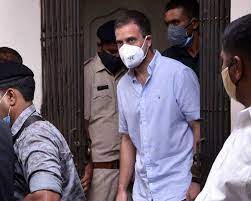Rahul Gandhi Defamation Case: Gujarat HC Quashes Order Denying Plea to Summon Additional Witnesses

A bench led by Justice Ilesh J Vora of the Gujarat High Court has quashed an order of a trial court denying to summon examination of additional witnesses in a defamation case against Indian National Congress (INC) leader Rahul Gandhi.
The court was hearing an application filed by Bharatiya Janata Party (BJP) MLA Purnesh Modi under S.311 of the Code of Criminal Procedure (CrPC). S. 311 CrPC empowers the court to summon material witnesses in a criminal case. The provision reads thus:
"311. Power to summon material witness, or examine person present. Any Court may, at any stage of any inquiry, trial or other proceeding under this Code, summon any person as a witness, or examine any person in attendance, though not summoned as a witness, or. recall and re- examine any person already examined; and the Court shall summon and examine or recall and re- examine any such person if his evidence appears to it to be essential to the just decision of the case."
The High Court found that the dismissal of the application by the Chief Judicial Magistrate, Surat (CJM) "was not in consonance and scope" with S.311 CrPC as prescribed under the provision and the "dictum of law settled by the Apex Court."
The brief facts of the case were that: The petitioner BJP MLA Purnesh Modi filed a defamation case under S. 499, 500 Indian Penal Code (IPC) against Gandhi alleging that he had made defamatory remarks in an election rally during 2019 General Assemble elections, with respect to the 'Modi' surname which were defamatory against the community at large.
The Surat court issued summons under S. 204 of CrPC after examining Modi's private complaint. Modi produced electronic records in a pen-drive and three CDs containing the alleged defamatory remarks in support of his case, however, Gandhi objected to the same on the technical ground that the contents of the electronic records were not submitted in the form as mandated in S.65(B) of the Evidence Act.
The witnesses produced by Modi to support his claims were not found to be of assistance to his case, upon which Modi moved the application under S. 311 to examine 4 witnesses of the video surveillance team at Kollar, Electoral Office. This application was rejected by the Surat Court.
Counsel for Modi, Adv. Harshad S. Tolia, argued that the trial court’s decision "lacks judicial application of mind" as "it did not consider that the whole case is based on the recording and to prove the same, the complainant has to examine those witnesses."
The petitioner placed reliance upon the judgement of the Apex Court in the case of Arjun Pandit Rao Khotkar Vs. Kailash Kushan Rao Gorantyal [2020 (7) SCC 1], and submitted that, "non-production of certificate in terms of S. 65B (4) of the Evidence Act, at the time of filing the complaint or not asking the certificate at the relevant point of time, would not be fatal to the case of the complainant, as it is a curable defect."
Adv. P.S. Champaneri, counsel for Gandhi opposed the petition stating that the petition under Art. 226 of the Constitution is not maintainable as the subject matter of the petition is against the interlocutory order. He further submitted that inherent powers under Section 482 of the Code may not be exercised in the peculiar facts and circumstances of the case, especially, when the complainant has been indolent and having regards to the facts there is no jurisdictional illegality or impropriety in the impugned order. The petition is liable to be dismissed, as petitioner has not made out a case for exercise of powers under S. 482 of CrPC to secure the ends of justice.
Referring to the decision of the Apex Court in the case of V. N. Patil vs. K. Niranjan Kumar & Ors [2021 (3) SCC 661], the court upheld that, "The object underlying S. 311 CrPC is that there may not be failure of justice on account of mistake of either party in bringing the valuable evidence on record or leaving ambiguity in the statement of the witnesses examined from either side. The determinative factor is whether it is essential for just decision of the case.” It recognized that examination of the witnesses who had infact recorded the video in which the alleged defamatory remarks were made was essential for the just decision of the case.
It noted that as remedy under Art. 226 of the Constitution is a discretionary power for doing complete justice and correcting injustice and S. 482 of CrPC empowers the High Court to exercise its inherent powers for securing ends of justice, the bench directed the trial court to hear and decide the case in accordance with law following the principles of admissibility of electronic record as propounded by the Apex Court in the case of Arjun Pandit.
Case Title: Purnesh Ishvarbhai Modi vs. State of Gujarat & Anr.
Edited by Shreya Agarwal
